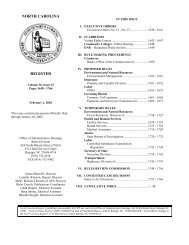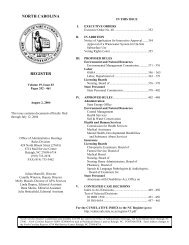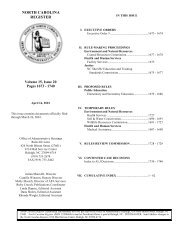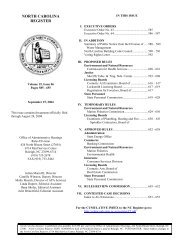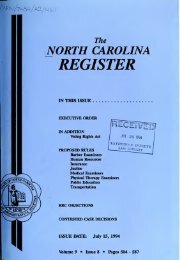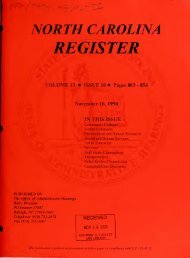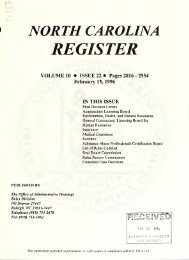NC Register Volume 21 Issue 09 - Office of Administrative Hearings
NC Register Volume 21 Issue 09 - Office of Administrative Hearings
NC Register Volume 21 Issue 09 - Office of Administrative Hearings
You also want an ePaper? Increase the reach of your titles
YUMPU automatically turns print PDFs into web optimized ePapers that Google loves.
PROPOSED RULES<br />
(a) All eating, drinking, cooking utensils, tables, sinks, cabinets,<br />
hoods, shelves, equipment, fixtures and other items used in<br />
connection with the preparation <strong>of</strong> food shall be kept clean and<br />
in good repair.<br />
(b) All surfaces with which food or drink come in contact shall<br />
consist <strong>of</strong> smooth, not readily corrodible, non-toxic materials in<br />
which there are no open cracks or joints that will collect food<br />
particles and slime, and shall be kept clean.<br />
(c) Shelves, tables and counters shall not be covered with paper,<br />
cardboard, oilcloth or other absorbent material, and shall be free<br />
<strong>of</strong> crevices. Dining table linen or similar dining table coverings,<br />
if used, shall be kept clean and in good repair.<br />
(d) Equipment shall meet ANSI sanitation standards, which are<br />
adopted by references in accordance with G.S. 150B-14(c). If<br />
equipment is not listed by an ANSI accredited education service<br />
program, the owner or operator shall submit documentation to<br />
the Department that demonstrates that the equipment is at least<br />
equivalent to ANSI sanitation standards. In doing so, if the<br />
components <strong>of</strong> the equipment are the same as those meeting<br />
ANSI sanitation standards, then the Department shall deem the<br />
equipment equivalent. For purposes <strong>of</strong> the rules <strong>of</strong> this Section,<br />
toasters, mixers, microwave ovens, hot water heaters and hoods<br />
shall not be considered to be equipment and shall not be required<br />
to meet ANSI sanitation standards. Existing equipment<br />
excluding dishwashing facilities not in compliance with this<br />
Rule must be brought into compliance by May 1, 2012.<br />
(e) Single-use articles such as formed buckets, bread wrappers,<br />
aluminum pie plates and No. 10 cans shall be used only once<br />
except that containers made <strong>of</strong> plastic, glass or other food grade<br />
material having smooth sides and <strong>of</strong> a construction that can be<br />
easily cleaned may be reused.<br />
(f) Beverage dispensers installed or replaced after the effective<br />
date <strong>of</strong> this Rule shall be designed to avoid activation by the lip<br />
<strong>of</strong> a cup or glass when these dispensers are used to refill cups or<br />
glasses.<br />
Authority G.S. 130A-235; 130A-248.<br />
15A <strong>NC</strong>AC 18A .3629 CLEANING OF EQUIPMENT<br />
AND UTENSILS<br />
(a) All equipment and fixtures shall be kept clean. All cloths<br />
used by chefs and other employees in the kitchen shall be clean.<br />
(b) All multi-use eating and drinking utensils shall be<br />
thoroughly washed, rinsed and subjected to a bactericidal<br />
treatment after each usage as specified in Paragraph (c) <strong>of</strong> this<br />
Rule.<br />
(c) In a hand dishwashing operation, after cleaning and rinsing,<br />
all multi-use eating and drinking utensils shall be subjected to<br />
one <strong>of</strong> the following or other equivalent bactericidal processes:<br />
(1) Immersion for at least one minute in the third<br />
compartment in clean hot water at a<br />
temperature <strong>of</strong> at least 170º F (77º C). A<br />
thermometer accurate to ±2º F (±1º C) shall be<br />
available and convenient to the compartment.<br />
Where hot water is used for bactericidal<br />
treatment, a booster heater that maintains a<br />
water temperature <strong>of</strong> at least 170º F (77º C) in<br />
the third compartment at all times when<br />
utensils are being washed shall be provided.<br />
The heating device may be integral with the<br />
immersion compartment.<br />
(2) Immersion for at least two minutes in the third<br />
compartment in a chemical bactericide <strong>of</strong><br />
strength approved by the Department:<br />
(A) for chlorine products, a solution<br />
containing at least 50 ppm <strong>of</strong><br />
available chlorine at a temperature <strong>of</strong><br />
at least 75º F (24º C);<br />
(B) for iodophor products, a solution<br />
containing at least 12.5 ppm <strong>of</strong><br />
available iodine and having a pH not<br />
higher than 5.0 and having a<br />
temperature <strong>of</strong> at least 75º F (24º C);<br />
and<br />
(C)<br />
for quaternary ammonium products, a<br />
solution containing at least 200 ppm<br />
<strong>of</strong> QAC and having a temperature <strong>of</strong><br />
at least 75º F (24º C), provided that<br />
the product is labeled to show that it<br />
is effective in water having a<br />
hardness value at least equal to that <strong>of</strong><br />
the water being used.<br />
(3) Other equivalent products and procedures<br />
approved in <strong>21</strong> CFR 178.1010 "Sanitizing<br />
solutions" from the "Food Service Sanitation<br />
Manual" published by the U.S. Food and Drug<br />
Administration. <strong>21</strong> CFR 178.1010 is adopted<br />
by reference in accordance with G.S. 150B-<br />
14(c).<br />
(d) A suitable testing method or equipment shall be available,<br />
convenient and regularly used to test chemical sanitizers to<br />
ensure minimum prescribed strengths.<br />
(e) The supply <strong>of</strong> eating and drinking utensils shall be <strong>of</strong><br />
sufficient quantity to allow washing, rinsing, sanitizing and airdrying<br />
before reuse. All multi-use utensils except pizza pans<br />
and similar type pans (not used for table service) used in the<br />
storage, preparation, cooking or serving <strong>of</strong> food or drink shall be<br />
cleaned and rinsed immediately after the day's operations, after<br />
each use or upon completion <strong>of</strong> each meal as indicated. Pizza<br />
pans and similar type pans (not used for table service) that are<br />
continually subjected to high temperatures do not require<br />
cleaning after each use or day's use but shall be kept clean and<br />
maintained in good repair.<br />
(f) In addition to washing and rinsing multi-use utensils as<br />
indicated in Paragraph (c) <strong>of</strong> this Rule, preparation surfaces<br />
which come in contact with potentially hazardous foods and are<br />
not subjected to heat during routine cooking operations shall be<br />
sanitized. Utensils and equipment that have been used for the<br />
preparation <strong>of</strong> raw meat or raw poultry shall not be used for the<br />
preparation <strong>of</strong> cooked meat, cooked poultry or other ready-to-eat<br />
products unless such utensils and equipment have been cleaned<br />
and sanitized. Examples <strong>of</strong> food contact surfaces that must be<br />
sanitized are utensils used in preparing cold salads and cold<br />
beverages, cutting boards, table tops, knives, saws and slicers.<br />
For utensils and equipment that are either too large or<br />
impractical to sanitize in a dishwashing machine or dishwashing<br />
sink, and for those resident camps that do not have dishwashing<br />
equipment, a spray-on or wipe-on sanitizer may be used. When<br />
<strong>21</strong>:<strong>09</strong> NORTH CAROLINA REGISTER NOVEMBER 1, 2006<br />
795




